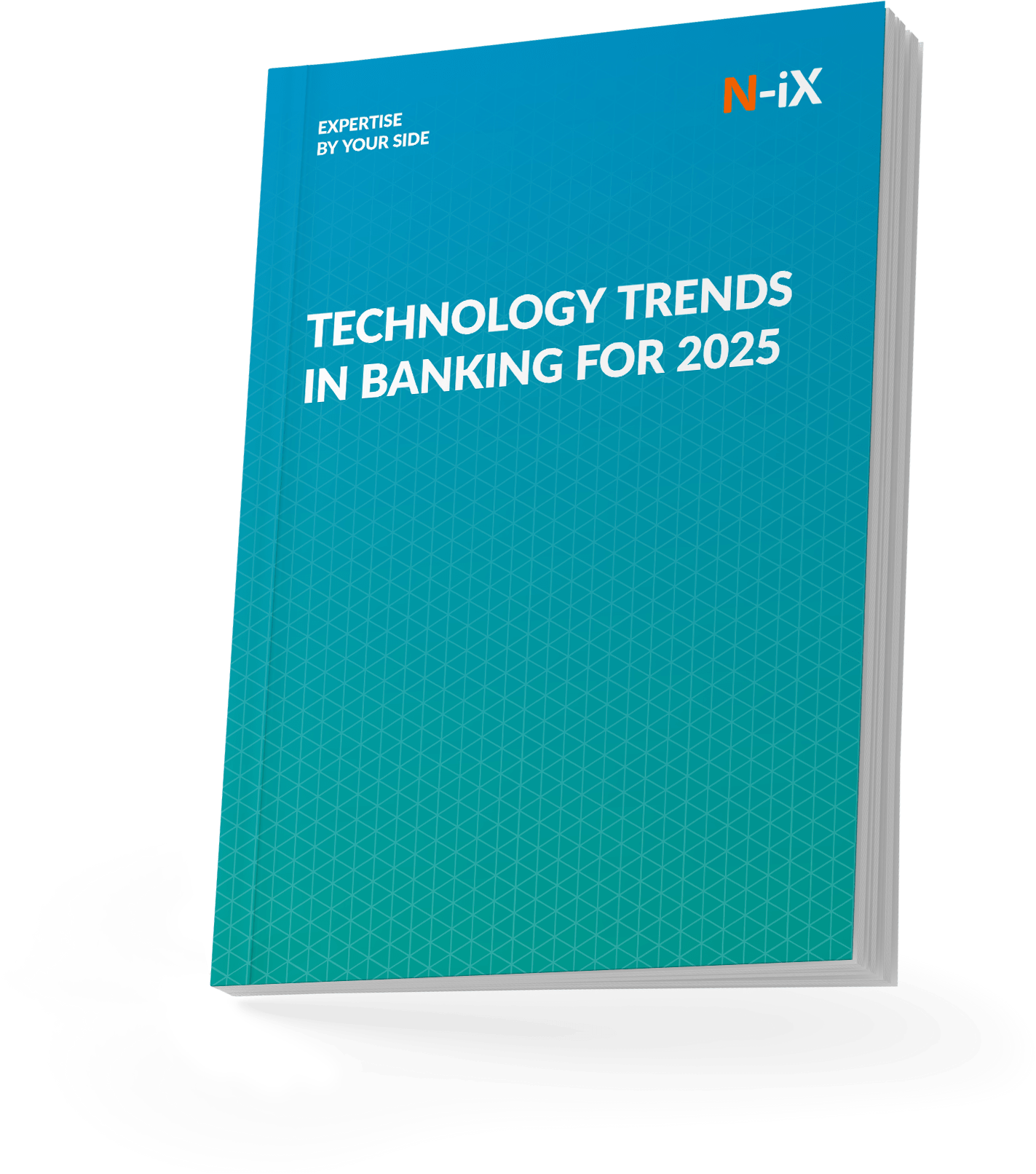Capital markets have been using advanced statistical tools, including AI, in trading for nearly a decade, well before the recent AI boom. However, with the current AI-powered financial software development trend, even this forward-thinking industry is set for transformation. Major American banks are already patenting their gen AI services, reflecting their strong belief that investing in this technology will yield significant benefits. Let's look at the use cases of AI in capital markets outside of trading.
Five AI applications in capital markets to improve productivity
AI's two core advantages over other statistical tools are its ability to analyze unstructured data—documents, reports, emails, and images—and develop its algorithms. Unlike traditional programming, where humans have to hard-code the model, ML algorithms can adjust their lower-level architecture during training, allowing them to adapt and improve automatically. The first advantage makes AI assistants perfect for streamlining document processing. The second helps analysts cut corners, save time, and automate the processes of finding patterns in the data. Here are five applications of AI in capital markets:
Robotic Process Automation (RPA)
Many repetitive, rule-based processes are time-consuming and prone to human error that an AI assistant could perform. Here are just a few examples:
- Client onboarding. AI models are great for extracting relevant information from legal documentation (ISDA, F&O, CSA, CMSLA, etc.) during client onboarding. They scan these complex legal documents and automatically identify essential terms, such as definitions of collateral, margin requirements, netting provisions, and other contractual obligations. Once these terms are identified, the system can extract and categorize them based on their relevance to the client's specific needs and add them to the client's profile.
- Trade support. AI-poweredRPA can automate comparing internal records with external statements, swiftly identifying and resolving discrepancies, which is crucial for institutions transitioning to a T+1 settlement cycle. Gen AI can automate the generation of settlement instructions, predict reconciliation issues, and facilitate better communication between counterparties, potentially improving efficiency by up to 50% [1].
- Data management. Capital markets generate massive amounts of data, much of which is unstructured. AI can be employed to gather, process, and analyze this data, offering valuable insights to inform decision-making.

Humans didn't evolve to do data processing; delegating these tasks to machines will drastically improve efficiency, enabling employees to concentrate on higher-level strategic tasks.
Streamlining and personalizing customer experience
Around 60% of operations in capital markets are conducted through verbal communication [1]. When a client makes a request, the company launches into a game of telephone, where information is passed from one operator to another, almost testing each other's aptitude in the game. Each handoff increases the risk of miscommunication or errors, as details can be misunderstood, misinterpreted, or lost entirely. This reliance on verbal communication is inefficient and unnecessary in an era where technology can seamlessly handle these transactions, forming an omnichannel experience.
AI models can analyze text and audio to identify action points and automatically feed them into other systems, such as CRM tools or trading platforms, without requiring manual input. Consolidating information about the client also allows for a more personalized approach.
AI in investment banking significantly enhances the process of creating pitch books and sales strategies. They identify what different investors typically value in a deal, such as financial performance, market trends, or industry-specific metrics. According to McKinsey, with the help of gen AI, the time spent on creating pitchbooks can be cut down by up to 30% [2]. The same approach can be applied to retail investment apps. The result is a more compelling and targeted sales strategy that is likely to resonate with investors, improving the chances of a successful deal.
Sentiment analysis using NLP
Emotions often play a more significant role in driving prices than the fundamental value of assets, especially during times of uncertainty. When investors are uncertain, they tend to react more to news, rumors, and the prevailing mood of the market rather than relying solely on the intrinsic value of securities. Traditional financial models, focusing primarily on fundamentals like earnings, dividends, and economic indicators, may not fully capture these emotional undercurrents. NLP models can conduct sentiment analysis: process social media posts, news articles, and market reports to detect the overall mood or sentiment in the market. For example, if AI detects a surge in negative sentiment around a particular stock due to a viral social media post, investors might choose to sell or short the stock before the price drops.

Regulatory compliance
Capital markets are a heavily regulated industry with an enormous data processing power for filing reports. The difficulty is increased even more by continuous updates and changes to the norms. AI models can learn how the processes should run and compare the actual real-time activity to that norm. Afterward, they generate reports based on the data that went through them. The AI model uses predictive analytics to forecast potential compliance issues before they occur. Analyzing trends and patterns predicts where and how future non-compliance might arise, allowing firms to take proactive measures to mitigate risks.
Using the previously collected client data, gen AI in investment banking can automate compliance monitoring for operators and traders, ensuring they stay within risk limits to prevent financial loss, verifying trades match the client's risk profile and investment goals, monitoring collateral for leveraged positions to reduce default risk, and ensuring trades comply with regional regulations.
Compliance monitoring is not always a liability; some rules are beneficial to the overall company's performance. AI-driven sentiment analysis is used to monitor the communications of sales teams and traders, typically through chat messages, emails, and other text-based interactions. By analyzing these communications' language, tone, and content, AI can detect signs of fatigue or stress among traders and sales personnel. This helps maintain employees' health and reduces the risk of mistakes that might arise from fatigue or stress.
Automated due diligence
AI in investment banking can save countless human hours of examining public records, financial statements, legal documents, news articles, social media, and proprietary databases during the due diligence process. It can then assess the risk of a potential investment or partnership across factors like financial health, legal history, market behavior, and regulatory compliance. For example, AI can identify unusual financial transactions, discrepancies in financial statements, or inconsistent information across different sources. These anomalies might indicate financial instability, fraud, or other risks affecting the deal's viability.
Due diligence is not just a one-time process; ongoing monitoring is often required to manage risks post-transaction. AI can automate continuous entity monitoring, tracking changes in financial performance, legal status, or market conditions.
Wrap up
AI excels at routine tasks involving data processing and pattern recognition, allowing humans to focus on achieving strategic objectives and boosting productivity. Today, AI in capital markets is being applied across various non-trading functions. The examples in automation, personalization, sentiment analysis, regulatory compliance, and automated due diligence showcase AI's versatility and its potential to streamline complex, data-heavy processes, ultimately boosting productivity and reducing human error.
How N-iX integrates AI into capital markets solutions
Over the past 23 years, N-iX has amassed significant expertise in delivering AI solutions and partnering with the financial industry. Our projects span developing peer-to-peer lending platforms, instant money transfer solutions, cloud-based Forex trading platforms, and more. As a dedicated technology partner, we provide cutting-edge solutions that comply with the most up-to-date security protocols and standards, ensuring the highest level of data integrity crucial for banks and financial institutions. We also specialize in creating comprehensive data governance, enabling financial companies to wield valuable customer data, improve user journeys, and boost client retention.
Our approach to digital transformation emphasizes long-term cooperation with clients, typically beginning with a smaller dedicated development team and expanding to include additional projects and solutions.
References
- Capital Markets Operations Reimagined with Generative AI, Broadbridge 2023
- How corporate and investment banks are tackling gen AI, McKinsey 2023
- Ibid.
Stay ahead in banking—explore 6 tech trends shaping the industry in 2025!


Success!

Have a question?
Speak to an expert




